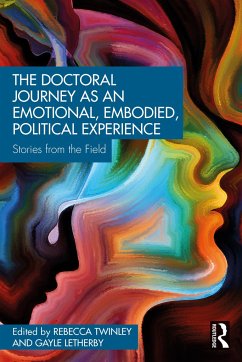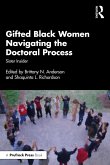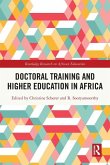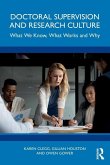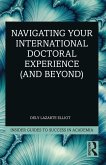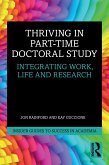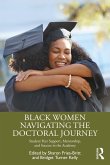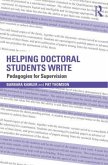The Doctoral Journey as an Emotional, Embodied, Political Experience
Stories from the Field
Herausgeber: Letherby, Gayle; Twinley, Rebecca
The Doctoral Journey as an Emotional, Embodied, Political Experience
Stories from the Field
Herausgeber: Letherby, Gayle; Twinley, Rebecca
- Broschiertes Buch
- Merkliste
- Auf die Merkliste
- Bewerten Bewerten
- Teilen
- Produkt teilen
- Produkterinnerung
- Produkterinnerung
This book is the first text of its kind to capture stories of involvement in doctoral journeys from students, supervisors, and examiners. Drawing from experiences across a variety of disciplines, these stories demonstrate the ways in which this journey is emotional, embodied, and political.
Andere Kunden interessierten sich auch für
![Gifted Black Women Navigating the Doctoral Process Gifted Black Women Navigating the Doctoral Process]() Gifted Black Women Navigating the Doctoral Process46,99 €
Gifted Black Women Navigating the Doctoral Process46,99 €![Doctoral Training and Higher Education in Africa Doctoral Training and Higher Education in Africa]() Doctoral Training and Higher Education in Africa50,99 €
Doctoral Training and Higher Education in Africa50,99 €![Doctoral Supervision and Research Culture Doctoral Supervision and Research Culture]() Karen CleggDoctoral Supervision and Research Culture44,99 €
Karen CleggDoctoral Supervision and Research Culture44,99 €![Navigating Your International Doctoral Experience (and Beyond) Navigating Your International Doctoral Experience (and Beyond)]() Dely Lazarte ElliotNavigating Your International Doctoral Experience (and Beyond)24,99 €
Dely Lazarte ElliotNavigating Your International Doctoral Experience (and Beyond)24,99 €![Thriving in Part-Time Doctoral Study Thriving in Part-Time Doctoral Study]() Jon RainfordThriving in Part-Time Doctoral Study24,99 €
Jon RainfordThriving in Part-Time Doctoral Study24,99 €![Black Women Navigating the Doctoral Journey Black Women Navigating the Doctoral Journey]() Black Women Navigating the Doctoral Journey37,99 €
Black Women Navigating the Doctoral Journey37,99 €![Helping Doctoral Students Write Helping Doctoral Students Write]() Barbara Kamler (Australia Deakin University)Helping Doctoral Students Write53,99 €
Barbara Kamler (Australia Deakin University)Helping Doctoral Students Write53,99 €-
-
-
This book is the first text of its kind to capture stories of involvement in doctoral journeys from students, supervisors, and examiners. Drawing from experiences across a variety of disciplines, these stories demonstrate the ways in which this journey is emotional, embodied, and political.
Produktdetails
- Produktdetails
- Verlag: Taylor & Francis Ltd
- Seitenzahl: 198
- Erscheinungstermin: 29. Dezember 2021
- Englisch
- Abmessung: 177mm x 393mm x 22mm
- Gewicht: 356g
- ISBN-13: 9780367352851
- ISBN-10: 0367352850
- Artikelnr.: 62570488
- Verlag: Taylor & Francis Ltd
- Seitenzahl: 198
- Erscheinungstermin: 29. Dezember 2021
- Englisch
- Abmessung: 177mm x 393mm x 22mm
- Gewicht: 356g
- ISBN-13: 9780367352851
- ISBN-10: 0367352850
- Artikelnr.: 62570488
Rebecca (Bex) Twinley I am Senior Lecturer in the School of Health Sciences at the University of Brighton, UK. In my doctoral work, I challenged the lack of acknowledgement regarding woman-to-woman rape and sexual assault. In doing so, I challenged my own pre-existing barriers and assumptions regarding subjectivity and objectivity by choosing to work from a sociological auto/biographical approach, as valuably guided by Gayle. I enjoy thinking critically and challenging norms, assumptions, and unaddressed issues that impact upon people and their subjective experiences of occupations. For this reason, I developed the concept of the 'dark side of occupation' as a means to challenge occupational therapists and scientists to consider aspects of occupations that are hidden, poorly understood, unrecognised or inconsistent with their personal or professional values. Gayle Letherby I am Visiting Professor (Sociology) at the University of Plymouth, UK and the University of Greenwich, UK. In my own doctoral work, I adopted an auto/biographical approach to focus on the status and experience of 'infertility' and 'involuntary childlessness'. As a postgraduate student, I also began to write with others about methodological issues and about working and learning in Higher Education. For me, learning and working in higher education has always been an emotional, embodied, political act. In the 24 years since finishing my PhD in 1997, the people I feels I have learnt the most from are those I have met as supervisor and as examiner at doctoral level. I have learnt much about a great many topics and methodological approaches as well the different experiences and challenges faced by students.
1. An Introduction to the Doctoral Journey as an Emotional, Embodied,
Political Experience Section I: Emotions, Embodiment, and Politics in
Practice 2. Mind the gap! Concerning Multi/Interdisciplinary Issues 3.
Moral Experience of Covenant Ethics in the Doctoral Journey 4. A Tent in
the Mountains: Supporting Artistic Creativity 5. When the Student Dies 6.
Navigating Mental Disability as a Doctoral Student 7. Exploring Different
Examining Practices Section II: Auto/Biographical Reflections of the
Doctoral Journey 8. Building a voice of influence: Supporting social
science doctoral students with disabilities 9. Exploring the PhD Supervisor
Self and Performance of Caring Work 10. The PhD Ritual: A Critical
Auto/Biographical Account 11. The Importance of Supportive Supervisory
Relationships to a Black Female Doctoral Researcher Working within African
Caribbean Communities Chapter 12. Unanticipated Ethical Issues during
Intergenerational Trauma Transmission Research 13. Experiencing Difference,
Difficulties, Emotions, and Relationships 14. Reflections on Transitional
Journeys to Academia 15. On the Emotions and Politics of Autoethnographic
Supervision 16. Relational doctoral supervision: practitioner/researcher,
insider/outsider and the value of reflexivity 17. Final Reflections
Political Experience Section I: Emotions, Embodiment, and Politics in
Practice 2. Mind the gap! Concerning Multi/Interdisciplinary Issues 3.
Moral Experience of Covenant Ethics in the Doctoral Journey 4. A Tent in
the Mountains: Supporting Artistic Creativity 5. When the Student Dies 6.
Navigating Mental Disability as a Doctoral Student 7. Exploring Different
Examining Practices Section II: Auto/Biographical Reflections of the
Doctoral Journey 8. Building a voice of influence: Supporting social
science doctoral students with disabilities 9. Exploring the PhD Supervisor
Self and Performance of Caring Work 10. The PhD Ritual: A Critical
Auto/Biographical Account 11. The Importance of Supportive Supervisory
Relationships to a Black Female Doctoral Researcher Working within African
Caribbean Communities Chapter 12. Unanticipated Ethical Issues during
Intergenerational Trauma Transmission Research 13. Experiencing Difference,
Difficulties, Emotions, and Relationships 14. Reflections on Transitional
Journeys to Academia 15. On the Emotions and Politics of Autoethnographic
Supervision 16. Relational doctoral supervision: practitioner/researcher,
insider/outsider and the value of reflexivity 17. Final Reflections
1. An Introduction to the Doctoral Journey as an Emotional, Embodied,
Political Experience Section I: Emotions, Embodiment, and Politics in
Practice 2. Mind the gap! Concerning Multi/Interdisciplinary Issues 3.
Moral Experience of Covenant Ethics in the Doctoral Journey 4. A Tent in
the Mountains: Supporting Artistic Creativity 5. When the Student Dies 6.
Navigating Mental Disability as a Doctoral Student 7. Exploring Different
Examining Practices Section II: Auto/Biographical Reflections of the
Doctoral Journey 8. Building a voice of influence: Supporting social
science doctoral students with disabilities 9. Exploring the PhD Supervisor
Self and Performance of Caring Work 10. The PhD Ritual: A Critical
Auto/Biographical Account 11. The Importance of Supportive Supervisory
Relationships to a Black Female Doctoral Researcher Working within African
Caribbean Communities Chapter 12. Unanticipated Ethical Issues during
Intergenerational Trauma Transmission Research 13. Experiencing Difference,
Difficulties, Emotions, and Relationships 14. Reflections on Transitional
Journeys to Academia 15. On the Emotions and Politics of Autoethnographic
Supervision 16. Relational doctoral supervision: practitioner/researcher,
insider/outsider and the value of reflexivity 17. Final Reflections
Political Experience Section I: Emotions, Embodiment, and Politics in
Practice 2. Mind the gap! Concerning Multi/Interdisciplinary Issues 3.
Moral Experience of Covenant Ethics in the Doctoral Journey 4. A Tent in
the Mountains: Supporting Artistic Creativity 5. When the Student Dies 6.
Navigating Mental Disability as a Doctoral Student 7. Exploring Different
Examining Practices Section II: Auto/Biographical Reflections of the
Doctoral Journey 8. Building a voice of influence: Supporting social
science doctoral students with disabilities 9. Exploring the PhD Supervisor
Self and Performance of Caring Work 10. The PhD Ritual: A Critical
Auto/Biographical Account 11. The Importance of Supportive Supervisory
Relationships to a Black Female Doctoral Researcher Working within African
Caribbean Communities Chapter 12. Unanticipated Ethical Issues during
Intergenerational Trauma Transmission Research 13. Experiencing Difference,
Difficulties, Emotions, and Relationships 14. Reflections on Transitional
Journeys to Academia 15. On the Emotions and Politics of Autoethnographic
Supervision 16. Relational doctoral supervision: practitioner/researcher,
insider/outsider and the value of reflexivity 17. Final Reflections

